Healthcare Ethics: Application of Principles and Theories - Case Study
VerifiedAdded on 2022/09/05
|6
|1469
|22
Case Study
AI Summary
This case study examines the ethical considerations in a healthcare scenario involving Mr. North, a patient with a terminal cardiac condition who requests that his wife not be informed of his prognosis due to her anxiety. The analysis applies key ethical principles, including autonomy (respecting the patient's right to make decisions), beneficence (acting in the patient's best interest), non-maleficence (avoiding harm), veracity (truthfulness), fidelity (loyalty), and justice (fairness). The study argues for the application of Utilitarianism theory, suggesting that concealing the truth is the best course of action to minimize harm and maximize overall well-being in this specific context. The document provides a thorough exploration of ethical decision-making in healthcare, offering valuable insights into the complexities faced by medical professionals.
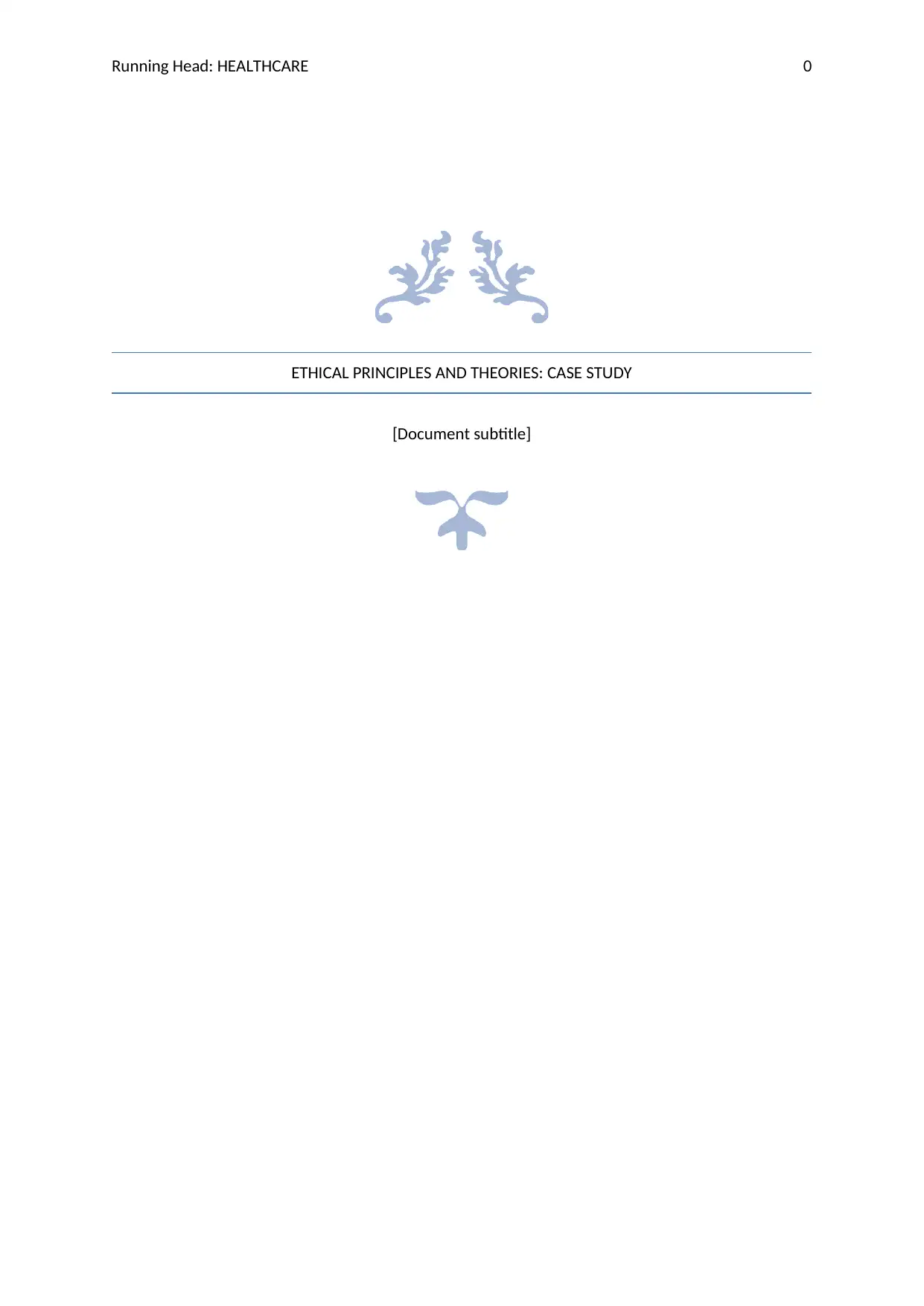
Running Head: HEALTHCARE 0
ETHICAL PRINCIPLES AND THEORIES: CASE STUDY
[Document subtitle]
ETHICAL PRINCIPLES AND THEORIES: CASE STUDY
[Document subtitle]
Paraphrase This Document
Need a fresh take? Get an instant paraphrase of this document with our AI Paraphraser
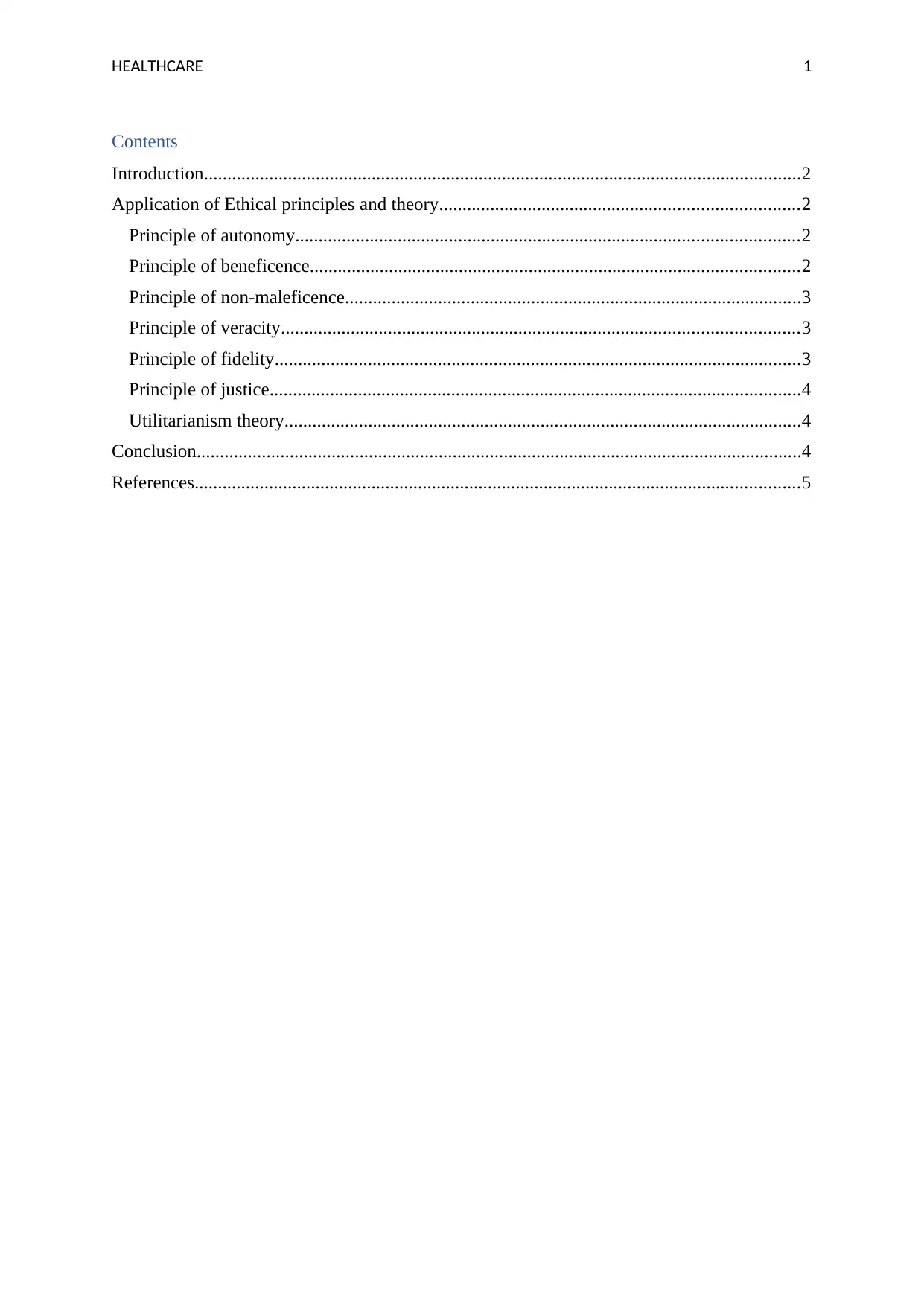
HEALTHCARE 1
Contents
Introduction................................................................................................................................2
Application of Ethical principles and theory.............................................................................2
Principle of autonomy............................................................................................................2
Principle of beneficence.........................................................................................................2
Principle of non-maleficence..................................................................................................3
Principle of veracity...............................................................................................................3
Principle of fidelity.................................................................................................................3
Principle of justice..................................................................................................................4
Utilitarianism theory...............................................................................................................4
Conclusion..................................................................................................................................4
References..................................................................................................................................5
Contents
Introduction................................................................................................................................2
Application of Ethical principles and theory.............................................................................2
Principle of autonomy............................................................................................................2
Principle of beneficence.........................................................................................................2
Principle of non-maleficence..................................................................................................3
Principle of veracity...............................................................................................................3
Principle of fidelity.................................................................................................................3
Principle of justice..................................................................................................................4
Utilitarianism theory...............................................................................................................4
Conclusion..................................................................................................................................4
References..................................................................................................................................5
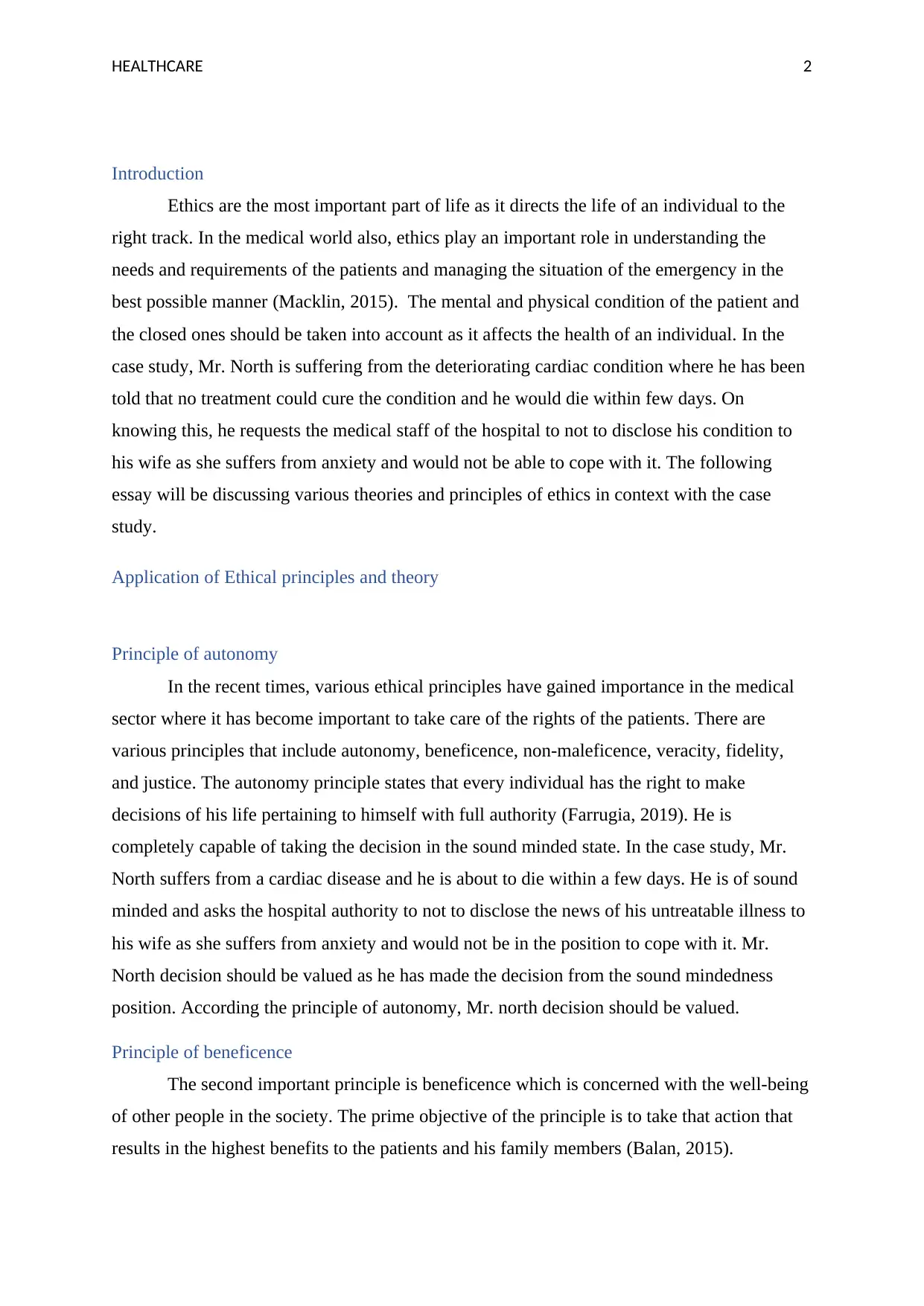
HEALTHCARE 2
Introduction
Ethics are the most important part of life as it directs the life of an individual to the
right track. In the medical world also, ethics play an important role in understanding the
needs and requirements of the patients and managing the situation of the emergency in the
best possible manner (Macklin, 2015). The mental and physical condition of the patient and
the closed ones should be taken into account as it affects the health of an individual. In the
case study, Mr. North is suffering from the deteriorating cardiac condition where he has been
told that no treatment could cure the condition and he would die within few days. On
knowing this, he requests the medical staff of the hospital to not to disclose his condition to
his wife as she suffers from anxiety and would not be able to cope with it. The following
essay will be discussing various theories and principles of ethics in context with the case
study.
Application of Ethical principles and theory
Principle of autonomy
In the recent times, various ethical principles have gained importance in the medical
sector where it has become important to take care of the rights of the patients. There are
various principles that include autonomy, beneficence, non-maleficence, veracity, fidelity,
and justice. The autonomy principle states that every individual has the right to make
decisions of his life pertaining to himself with full authority (Farrugia, 2019). He is
completely capable of taking the decision in the sound minded state. In the case study, Mr.
North suffers from a cardiac disease and he is about to die within a few days. He is of sound
minded and asks the hospital authority to not to disclose the news of his untreatable illness to
his wife as she suffers from anxiety and would not be in the position to cope with it. Mr.
North decision should be valued as he has made the decision from the sound mindedness
position. According the principle of autonomy, Mr. north decision should be valued.
Principle of beneficence
The second important principle is beneficence which is concerned with the well-being
of other people in the society. The prime objective of the principle is to take that action that
results in the highest benefits to the patients and his family members (Balan, 2015).
Introduction
Ethics are the most important part of life as it directs the life of an individual to the
right track. In the medical world also, ethics play an important role in understanding the
needs and requirements of the patients and managing the situation of the emergency in the
best possible manner (Macklin, 2015). The mental and physical condition of the patient and
the closed ones should be taken into account as it affects the health of an individual. In the
case study, Mr. North is suffering from the deteriorating cardiac condition where he has been
told that no treatment could cure the condition and he would die within few days. On
knowing this, he requests the medical staff of the hospital to not to disclose his condition to
his wife as she suffers from anxiety and would not be able to cope with it. The following
essay will be discussing various theories and principles of ethics in context with the case
study.
Application of Ethical principles and theory
Principle of autonomy
In the recent times, various ethical principles have gained importance in the medical
sector where it has become important to take care of the rights of the patients. There are
various principles that include autonomy, beneficence, non-maleficence, veracity, fidelity,
and justice. The autonomy principle states that every individual has the right to make
decisions of his life pertaining to himself with full authority (Farrugia, 2019). He is
completely capable of taking the decision in the sound minded state. In the case study, Mr.
North suffers from a cardiac disease and he is about to die within a few days. He is of sound
minded and asks the hospital authority to not to disclose the news of his untreatable illness to
his wife as she suffers from anxiety and would not be in the position to cope with it. Mr.
North decision should be valued as he has made the decision from the sound mindedness
position. According the principle of autonomy, Mr. north decision should be valued.
Principle of beneficence
The second important principle is beneficence which is concerned with the well-being
of other people in the society. The prime objective of the principle is to take that action that
results in the highest benefits to the patients and his family members (Balan, 2015).
⊘ This is a preview!⊘
Do you want full access?
Subscribe today to unlock all pages.

Trusted by 1+ million students worldwide
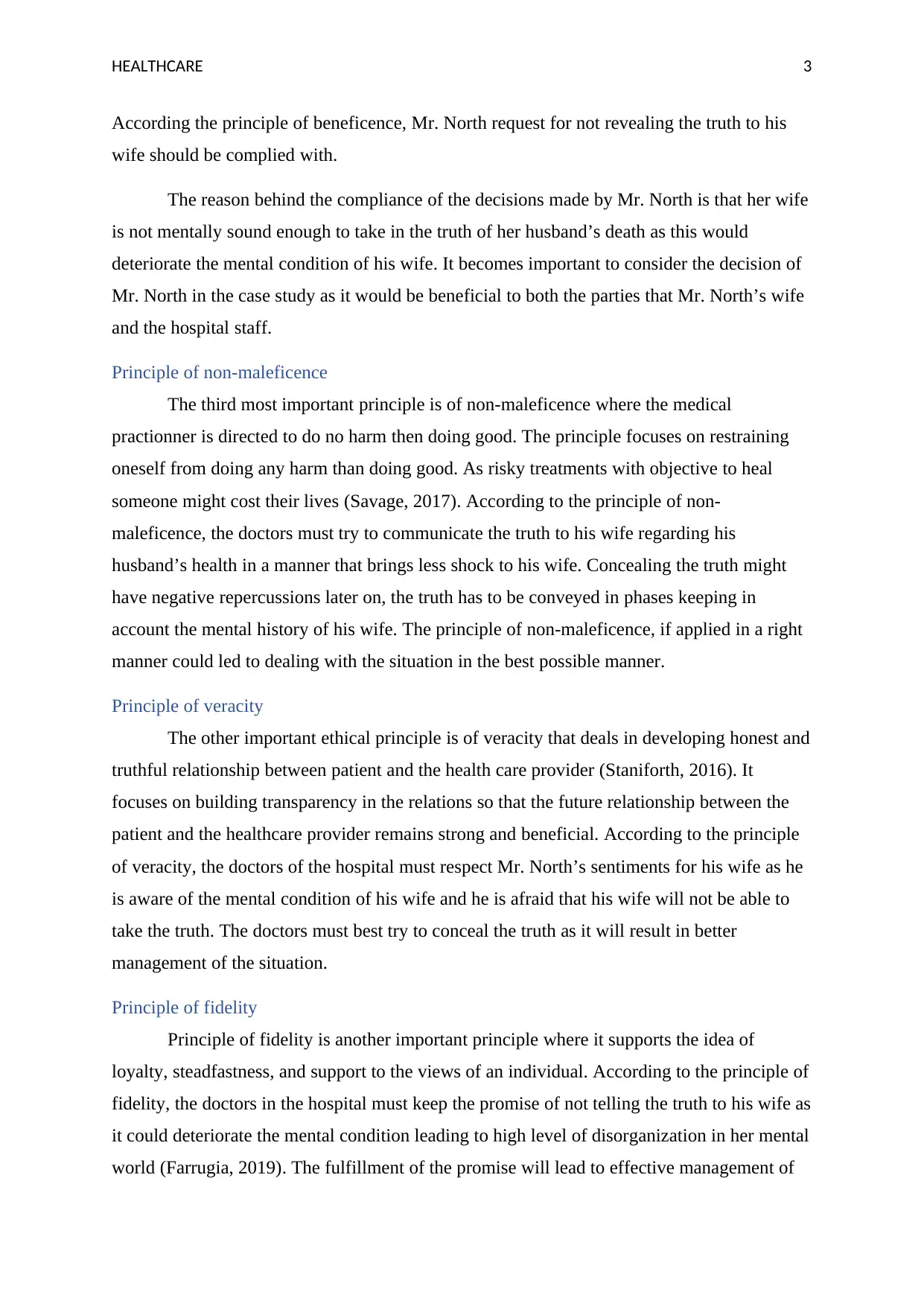
HEALTHCARE 3
According the principle of beneficence, Mr. North request for not revealing the truth to his
wife should be complied with.
The reason behind the compliance of the decisions made by Mr. North is that her wife
is not mentally sound enough to take in the truth of her husband’s death as this would
deteriorate the mental condition of his wife. It becomes important to consider the decision of
Mr. North in the case study as it would be beneficial to both the parties that Mr. North’s wife
and the hospital staff.
Principle of non-maleficence
The third most important principle is of non-maleficence where the medical
practionner is directed to do no harm then doing good. The principle focuses on restraining
oneself from doing any harm than doing good. As risky treatments with objective to heal
someone might cost their lives (Savage, 2017). According to the principle of non-
maleficence, the doctors must try to communicate the truth to his wife regarding his
husband’s health in a manner that brings less shock to his wife. Concealing the truth might
have negative repercussions later on, the truth has to be conveyed in phases keeping in
account the mental history of his wife. The principle of non-maleficence, if applied in a right
manner could led to dealing with the situation in the best possible manner.
Principle of veracity
The other important ethical principle is of veracity that deals in developing honest and
truthful relationship between patient and the health care provider (Staniforth, 2016). It
focuses on building transparency in the relations so that the future relationship between the
patient and the healthcare provider remains strong and beneficial. According to the principle
of veracity, the doctors of the hospital must respect Mr. North’s sentiments for his wife as he
is aware of the mental condition of his wife and he is afraid that his wife will not be able to
take the truth. The doctors must best try to conceal the truth as it will result in better
management of the situation.
Principle of fidelity
Principle of fidelity is another important principle where it supports the idea of
loyalty, steadfastness, and support to the views of an individual. According to the principle of
fidelity, the doctors in the hospital must keep the promise of not telling the truth to his wife as
it could deteriorate the mental condition leading to high level of disorganization in her mental
world (Farrugia, 2019). The fulfillment of the promise will lead to effective management of
According the principle of beneficence, Mr. North request for not revealing the truth to his
wife should be complied with.
The reason behind the compliance of the decisions made by Mr. North is that her wife
is not mentally sound enough to take in the truth of her husband’s death as this would
deteriorate the mental condition of his wife. It becomes important to consider the decision of
Mr. North in the case study as it would be beneficial to both the parties that Mr. North’s wife
and the hospital staff.
Principle of non-maleficence
The third most important principle is of non-maleficence where the medical
practionner is directed to do no harm then doing good. The principle focuses on restraining
oneself from doing any harm than doing good. As risky treatments with objective to heal
someone might cost their lives (Savage, 2017). According to the principle of non-
maleficence, the doctors must try to communicate the truth to his wife regarding his
husband’s health in a manner that brings less shock to his wife. Concealing the truth might
have negative repercussions later on, the truth has to be conveyed in phases keeping in
account the mental history of his wife. The principle of non-maleficence, if applied in a right
manner could led to dealing with the situation in the best possible manner.
Principle of veracity
The other important ethical principle is of veracity that deals in developing honest and
truthful relationship between patient and the health care provider (Staniforth, 2016). It
focuses on building transparency in the relations so that the future relationship between the
patient and the healthcare provider remains strong and beneficial. According to the principle
of veracity, the doctors of the hospital must respect Mr. North’s sentiments for his wife as he
is aware of the mental condition of his wife and he is afraid that his wife will not be able to
take the truth. The doctors must best try to conceal the truth as it will result in better
management of the situation.
Principle of fidelity
Principle of fidelity is another important principle where it supports the idea of
loyalty, steadfastness, and support to the views of an individual. According to the principle of
fidelity, the doctors in the hospital must keep the promise of not telling the truth to his wife as
it could deteriorate the mental condition leading to high level of disorganization in her mental
world (Farrugia, 2019). The fulfillment of the promise will lead to effective management of
Paraphrase This Document
Need a fresh take? Get an instant paraphrase of this document with our AI Paraphraser
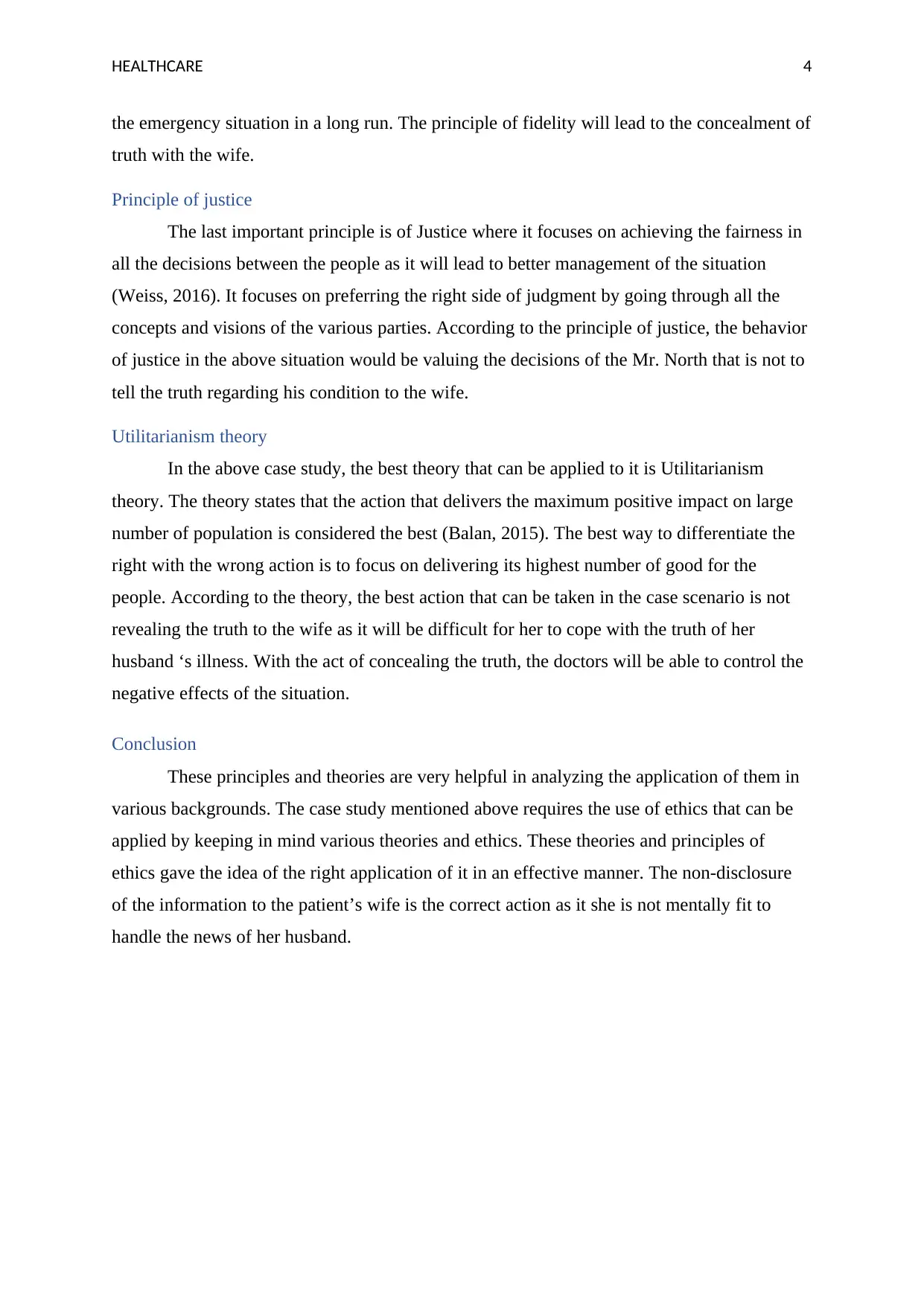
HEALTHCARE 4
the emergency situation in a long run. The principle of fidelity will lead to the concealment of
truth with the wife.
Principle of justice
The last important principle is of Justice where it focuses on achieving the fairness in
all the decisions between the people as it will lead to better management of the situation
(Weiss, 2016). It focuses on preferring the right side of judgment by going through all the
concepts and visions of the various parties. According to the principle of justice, the behavior
of justice in the above situation would be valuing the decisions of the Mr. North that is not to
tell the truth regarding his condition to the wife.
Utilitarianism theory
In the above case study, the best theory that can be applied to it is Utilitarianism
theory. The theory states that the action that delivers the maximum positive impact on large
number of population is considered the best (Balan, 2015). The best way to differentiate the
right with the wrong action is to focus on delivering its highest number of good for the
people. According to the theory, the best action that can be taken in the case scenario is not
revealing the truth to the wife as it will be difficult for her to cope with the truth of her
husband ‘s illness. With the act of concealing the truth, the doctors will be able to control the
negative effects of the situation.
Conclusion
These principles and theories are very helpful in analyzing the application of them in
various backgrounds. The case study mentioned above requires the use of ethics that can be
applied by keeping in mind various theories and ethics. These theories and principles of
ethics gave the idea of the right application of it in an effective manner. The non-disclosure
of the information to the patient’s wife is the correct action as it she is not mentally fit to
handle the news of her husband.
the emergency situation in a long run. The principle of fidelity will lead to the concealment of
truth with the wife.
Principle of justice
The last important principle is of Justice where it focuses on achieving the fairness in
all the decisions between the people as it will lead to better management of the situation
(Weiss, 2016). It focuses on preferring the right side of judgment by going through all the
concepts and visions of the various parties. According to the principle of justice, the behavior
of justice in the above situation would be valuing the decisions of the Mr. North that is not to
tell the truth regarding his condition to the wife.
Utilitarianism theory
In the above case study, the best theory that can be applied to it is Utilitarianism
theory. The theory states that the action that delivers the maximum positive impact on large
number of population is considered the best (Balan, 2015). The best way to differentiate the
right with the wrong action is to focus on delivering its highest number of good for the
people. According to the theory, the best action that can be taken in the case scenario is not
revealing the truth to the wife as it will be difficult for her to cope with the truth of her
husband ‘s illness. With the act of concealing the truth, the doctors will be able to control the
negative effects of the situation.
Conclusion
These principles and theories are very helpful in analyzing the application of them in
various backgrounds. The case study mentioned above requires the use of ethics that can be
applied by keeping in mind various theories and ethics. These theories and principles of
ethics gave the idea of the right application of it in an effective manner. The non-disclosure
of the information to the patient’s wife is the correct action as it she is not mentally fit to
handle the news of her husband.
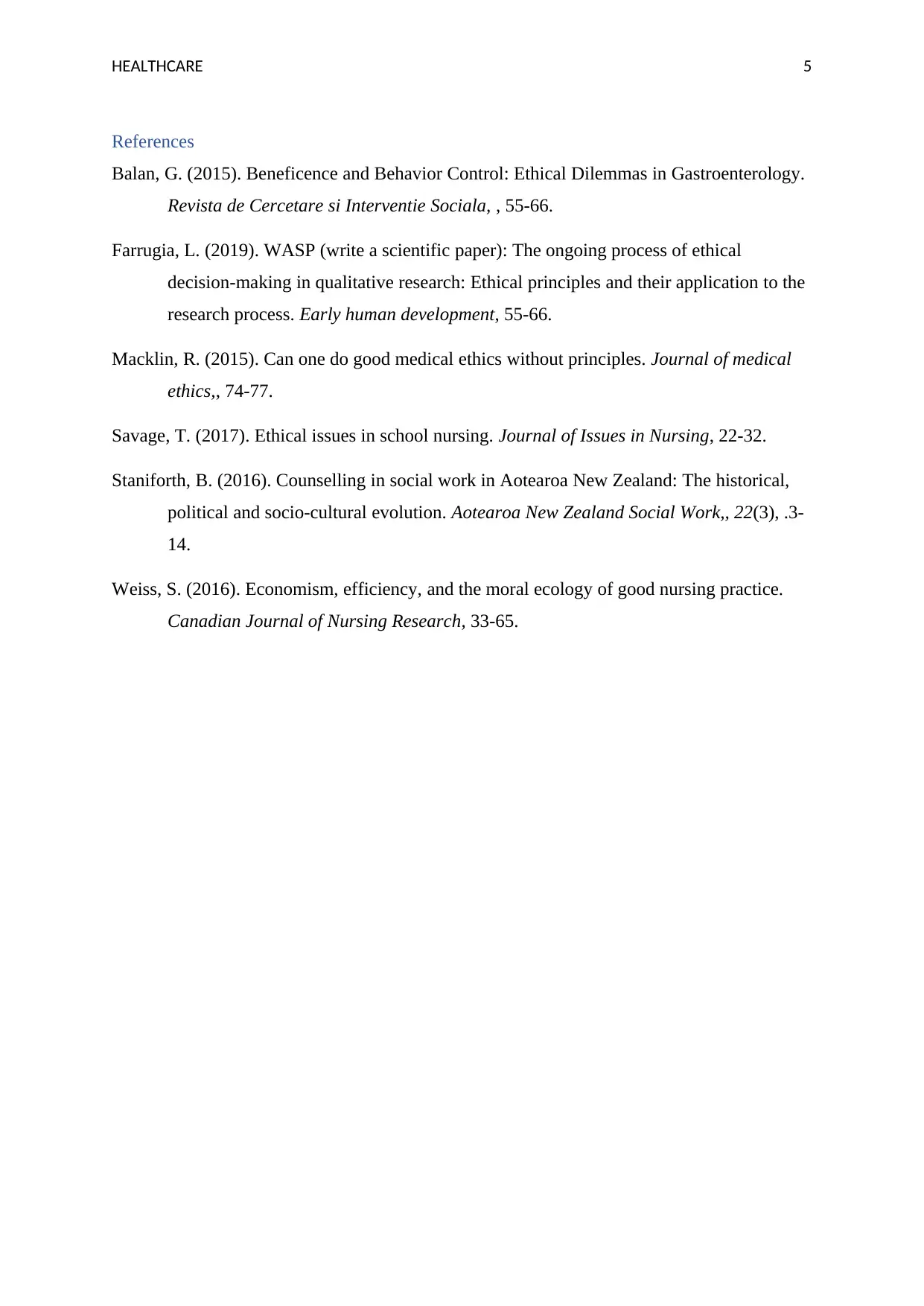
HEALTHCARE 5
References
Balan, G. (2015). Beneficence and Behavior Control: Ethical Dilemmas in Gastroenterology.
Revista de Cercetare si Interventie Sociala, , 55-66.
Farrugia, L. (2019). WASP (write a scientific paper): The ongoing process of ethical
decision-making in qualitative research: Ethical principles and their application to the
research process. Early human development, 55-66.
Macklin, R. (2015). Can one do good medical ethics without principles. Journal of medical
ethics,, 74-77.
Savage, T. (2017). Ethical issues in school nursing. Journal of Issues in Nursing, 22-32.
Staniforth, B. (2016). Counselling in social work in Aotearoa New Zealand: The historical,
political and socio-cultural evolution. Aotearoa New Zealand Social Work,, 22(3), .3-
14.
Weiss, S. (2016). Economism, efficiency, and the moral ecology of good nursing practice.
Canadian Journal of Nursing Research, 33-65.
References
Balan, G. (2015). Beneficence and Behavior Control: Ethical Dilemmas in Gastroenterology.
Revista de Cercetare si Interventie Sociala, , 55-66.
Farrugia, L. (2019). WASP (write a scientific paper): The ongoing process of ethical
decision-making in qualitative research: Ethical principles and their application to the
research process. Early human development, 55-66.
Macklin, R. (2015). Can one do good medical ethics without principles. Journal of medical
ethics,, 74-77.
Savage, T. (2017). Ethical issues in school nursing. Journal of Issues in Nursing, 22-32.
Staniforth, B. (2016). Counselling in social work in Aotearoa New Zealand: The historical,
political and socio-cultural evolution. Aotearoa New Zealand Social Work,, 22(3), .3-
14.
Weiss, S. (2016). Economism, efficiency, and the moral ecology of good nursing practice.
Canadian Journal of Nursing Research, 33-65.
⊘ This is a preview!⊘
Do you want full access?
Subscribe today to unlock all pages.

Trusted by 1+ million students worldwide
1 out of 6
Related Documents
Your All-in-One AI-Powered Toolkit for Academic Success.
+13062052269
info@desklib.com
Available 24*7 on WhatsApp / Email
![[object Object]](/_next/static/media/star-bottom.7253800d.svg)
Unlock your academic potential
Copyright © 2020–2025 A2Z Services. All Rights Reserved. Developed and managed by ZUCOL.





